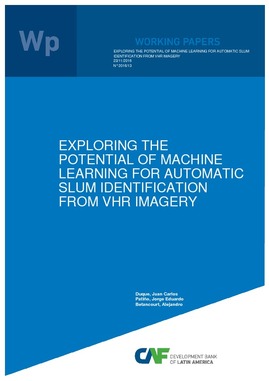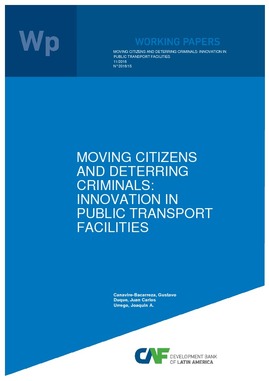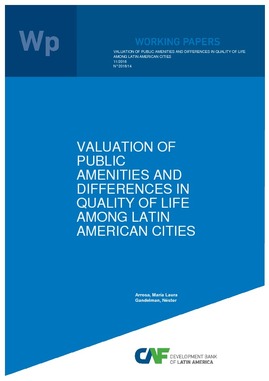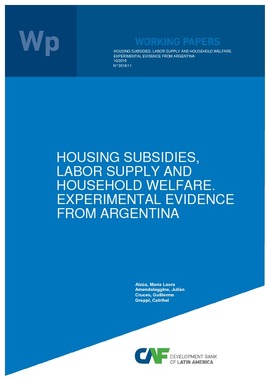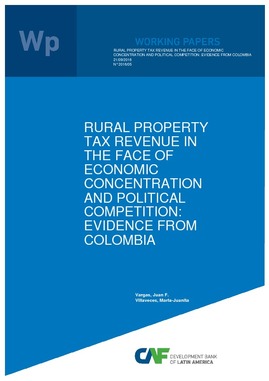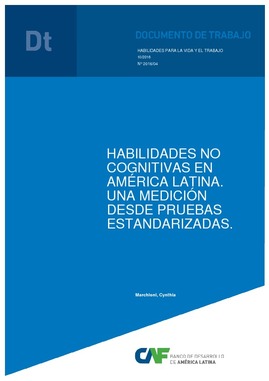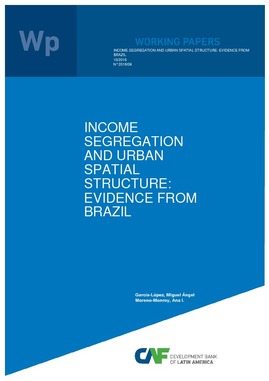6.1 Documentos de trabajo en investigación socioeconómica: Envíos recientes
Mostrando ítems 101-120 de 209
-
Benefits to Elite Schools and the Expected Returns to Education: Evidence from Mexico City
(CAF; Buenos Aires, 2017-03-10)We exploit data on the future earnings students at high school completion expect to receive with and without a college education, together with information on learning achievement and college outcomes, to study the benefits ... -
Informality and Productivity: The Role of Unemployment Insurance Schemes
(CAF; Buenos Aires, 2017-02-22)We study the design of optimal unemployment protection schemes to evaluate its impact on labor markets, welfare and productivity. We consider a life-cycle economies with formal and informal labor markets, unobservable ... -
Public expenditures and debt at the subnational level: Evidence of fiscal smoothing from Argentina
(CAF; Buenos Aires, 2017-01-30)This paper uses the particular features of the tax-sharing regime Coparticipación Federal de Impuestos and the fact that some provinces earn hydrocarbon royalties to investigate public expenditures and debt at the subnational ... -
El Fenómeno de los NiNis en América Latina
(CAF; Buenos Aires, 2016-12-30)En los últimos años, y en todos los países de la región, se ha ido incrementando la preocupación por la situación de los jóvenes que ni se encuentran insertos en el sistema educativo ni se han integrado al mercado laboral ... -
Inequality, Crime, and the Long Run Legacy of Slavery
(CAF; Bogotá, 2016-12-25)This paper investigates the relationship between economic inequality and crime in Colombian municipalities. Following recent scholarly research that suggests that the legacy of slavery is largely manifest in persistent ... -
Effect of Socio-Economic Stratification on House Value in Bogotá
(CAF; Bogotá, 2016-12-24)This paper investigates the impact of urban fiscal policies on housing value. We use a focalization system in Bogotá where certain subsidies and taxes are targeted based on a classification of houses according to external ... -
Internet and Labor Income: Places and Activities in Colombia
(CAF; Bogotá, 2016-12-21)Despite the literature in the richest countries about the positive correlation between Internet and income, there is still an open question about the utility of this technology the developing world. This paper uses Propensity ... -
High-skilled workers´ segregation and productivity in Latin American cities
(CAF; Buenos Aires, 2016-12)The aim of this work is to study the relationship between high-skilled workers’ segregation and productivity in Latin American cities. This relationship is not clear at first sight. On the one hand high-skilled workers’ ... -
Exploring the Potential of Machine Learning for Automatic Slum Identification from VHE Imagery
(CAF; Buenos Aires, 2016-11-23)Slum identification in urban settlements is a crucial step in the process of formulation of propoor policies. However, the use of conventional methods for slums detection such as field surveys may result time consuming and ... -
What is the Role of Urban Growth on Inequality, and Segregation? The Case of Urban Argentina´s Urban Agglomerations
(CAF; Buenos Aires, 2016-11)We analyze the relationship between urban sprawl and changing patterns of inequality and segregation in metropolitan areas of Argentina. The existing literature has endeavored to study the determinants of the expansion of ... -
Moving Citizens and Deterring Criminals: Innovation in Public Transport Facilities
(CAF; Buenos Aires, 2016-11)This paper explores the relationship between urban public transportation innovation and crime. In 2004, the city of Medellin in Colombia developed an innovative public transportation system based on cable cars (Metrocable) ... -
Valuation of Public Amenities and Differences in Quality of Life among Latin American Cities
(CAF; Buenos Aires, 2016-11)We use a life satisfaction approach for the valuation of public goods and amenities in Latin American cities. We apply a homogenous database of seventeen cities gathered by the Development Bank of Latin America CAF. Using ... -
Slum Growth in Brazilian Cities
(CAF; Caracas, 2016-10-10)I study slum growth in contemporary urbanization processes by estimating a spatial equilibrium model with houses with and without basic water and sanitation services in Brazilian cities between 1991 and 2010. Slum growth ... -
City Size, Distance and Formal Employment Creation
(CAF; Caracas, 2016-10-09)Cities thrive through the diversity of their occupants because the availability of complementary skills enables firms in the formal sector to grow, delivering increasingly sophisticated products and services. The appearance ... -
Integrating Early-life Shocks and Human Capital Investments on Children´s Education
(CAF; Colombia, 2016-10-04)This study investigates how early-life conditions interact with subsequent human capital investments to influence future educational outcomes. To provide causal evidence, we exploit two sources of exogenous variation: i) ... -
Housing Subsidies, Labor Supply and Household Welfare. Experimental Evidence from Argentina
(CAF; Buenos Aires, 2016-10)We study the impact of a social housing policy program implemented in Argentina, exploiting the random assignment rule to identify the policy's causal effect on labor market and other socio-economic outcomes. In particular, ... -
Rural Property Tax Revenue in the Face of Economic Concentration and Political Competition: Evidence from Colombia
(CAF; Caracas, 2016-09-21)We study the relationship between two sources of political power and property tax revenues in contemporary rural Colombia. First, de jure political power is the extent to which local political elites can capture the public ... -
Habilidades no cognitivas en América Latina. Una medición desde pruebas estandarizadas.
(CAF, 2016-08-31)Medir habilidades es complejo, pues son inobservables. Este problema es particularmente importante en la medición de habilidades no cognitivas, donde usualmente se emplean métodos basados en el auto-reporte. Como alternativa ... -
Income Segregation and Urban Spatial Structure: Evidence from Brazil
(CAF; Caracas, 2016-08-05)We estimate the effect of urban spatial structure on income segregation in Brazilian cities between 2000 and 2010. Our results show that, first, local density conditions increase income segregation: the effect is higher ... -
Moving “away" from Opportunities?: Homeownership and Employment
(CAF; Santiago de Chile, 2016-07-10)Homeownership is promoted by the majority of OECD member countries. Nevertheless, the impact that owning a house can have on employment levels is not fully understood. In this paper, we estimate the causal effect of ...




